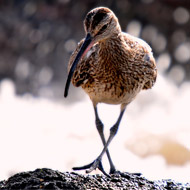Volunteers sought to tackle wading bird decline

Since 1994, the population of curlew in Scotland has fallen by 61 per cent.
Scotland’s Rural College (SRUC) has issued an urgent call for volunteers to help tackle the mass decline of wading birds in Scotland.
The College says that since 1994, the population of curlew has fallen by 61 per cent, lapwing by 53 per cent and oystercatcher by 40 per cent.
The Working for Waders initiative, set up by the Scottish Government, aims to encourage new activities to halt and reverse these declines.
Earlier this year, SRUC helped to facilitate workshops that identified the need to:
- deliver results-led collaborative action on the ground
- collate data and identify hot spots and zones for waders
- raise awareness of the plight of waders and develop and share best practice to reverse declines.
The College is now looking for volunteers to join these action groups and help develop recommendations as to how they can be delivered.
Davy McCracken, chair of the Working for Waders Facilitation team said: “Over this winter, we are focusing on two main goals: to identify and highlight where actions for waders are already being taken on the ground, and to flesh-out what needs to be done in practice to take forward three key actions identified by participants at the wader workshops.
“To achieve these goals we need the support and engagement of all those concerned about wader declines in Scotland.”
For further details about the initiative and to register your interest visit http://www.moorlandforum.org.uk/contact-us indicating which of the three groups you would like to contribute to.



 The Animal and Plant Health Agency (APHA) has updated its online reporting service for dead wild birds.
The Animal and Plant Health Agency (APHA) has updated its online reporting service for dead wild birds.